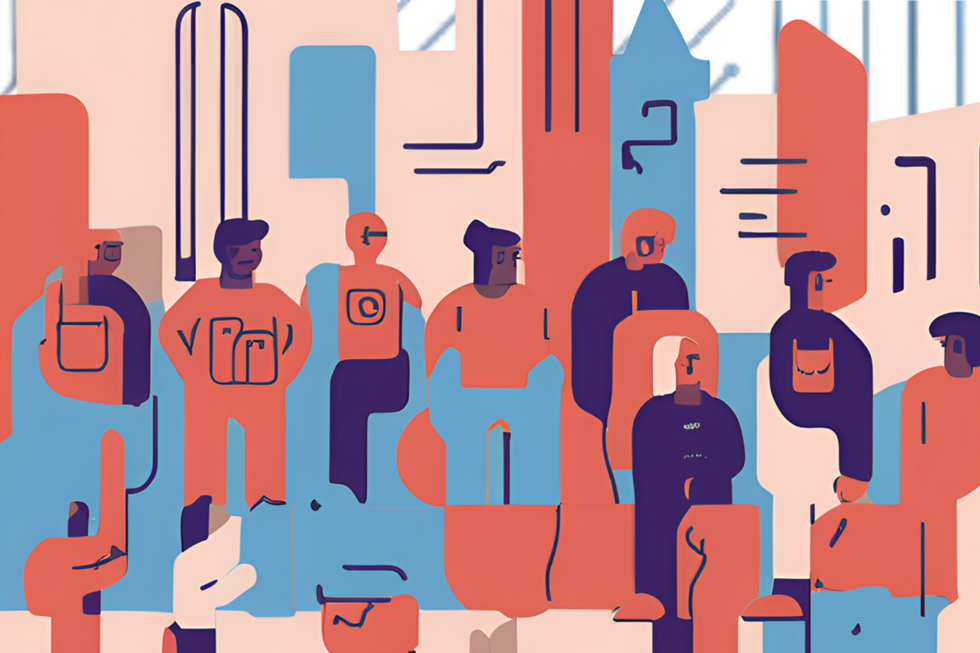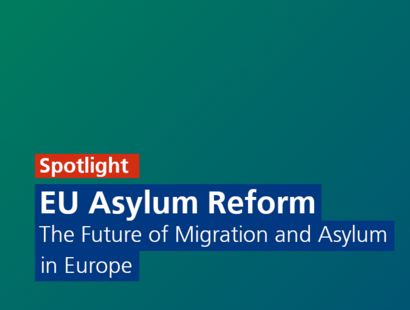How cities can safeguard migrants‘ digital rights

In your paper, you discuss the key provisions of the New Pact on Migration and Asylum. Could you provide an overview of the most significant changes and explain why you believe these regulations pose a risk to the digital rights of migrants?
Léa Lebon: The new Pact on Migration and Asylum includes several legislative packages on migration management and asylum procedures, such as the pre-screening procedure and reform of the Eurodac biometric database. The pre-entry screening procedure has been introduced to collect the biometric data of third-country nationals arriving at the border of a Member State, including irregular migrants apprehended within the territory of a Member State. In a context of more restrictive migration and border management policies, there is a clear risk that the New Pact will strengthen disproportionate surveillance, promulgate discriminatory procedures based on technology and boost data protection violations.
You mention the increased use of biometric data and facial recognition for migration control. What are the specific dangers these technologies present in terms of protecting the privacy and fundamental rights of migrants?
Léa Lebon: One of the specific dangers of the use of biometric data and facial recognition concerns the right to information and control over personal data, with migrants rarely able to exercise their rights to access, rectify, and delete personal data. The use of individuals’ faces as input data to improve facial recognition algorithms is often done without the individual’s knowledge or consent, and a migrant’s refusal to undergo fingerprinting is often used as justification for the collection of additional biometric data.
Furthermore, there is a risk that this information is shared with authorities in their home countries from which they fled, increasing persecution risks of the individual and their family members.
A last main concern regarding the use of biometric data and facial recognition is the intensification of the current discriminatory policing and racial profiling targeting communities of colour in Europe. The pre-entry screening procedure will apply to all suspected undocumented migrants at the external borders and within the EU, meaning that people could be apprehended in a Member State for identity verification and detained for up to three days for data collection. This may heighten the risk of racial profiling and arbitrary detention, particularly for people of color.
According to your study, cities are playing an increasingly important role in protecting the digital rights of migrants. Could you explain the role of local integration policies in that regard?
Léa Lebon: Some cities try to protect migrant privacy, particularly for those with irregular status, by ensuring access to essential services for example without requiring identification like in Amsterdam. Local city councils will act as funders of organizations providing services normally provided by the municipality, ensuring that irregular migrants are not forced to share their data or expose the city council to political pressures.
At the same time, municipalities try to leverage digital tools like language models, databases and translation services to implement local integration policies.
Katharina Bamberg/Eurocities: Cities are the forefront of providing services such as housing, healthcare, education and employment to migrant populations. As these services become increasingly digitalized, cities handle vast amounts of migrants' personal data. This makes their policies and the prioritization of data protection critical in safeguarding the digital rights of migrants.
What challenges do cities face in this role, particularly in light of the new EU legal framework?
Léa Lebon: Migration management policies like Eurodac affect cities’ capacities to meet their legal or moral obligations. Extensive data-sharing systems aggravate the risk of undocumented migrants being apprehended while accessing essential services, dissuading them from seeking help.
Moreover, the reformed Eurodac weakens privacy protections, causing confusion in cities over efforts to safeguard refugee and migrant data.
Katharina Bamberg/Eurocities: Cities face several challenges in protecting migrants' digital rights under the new EU legal framework as outlined in the New Pact on Migration and Asylum. These challenges stem from legal, operational, and technological complexities. For one, cities are not included in the decision-making processes regarding the implementation of regulations of the Pact, even though they are directly implicated as key integration stakeholders at the local level.
Moreover, cities must balance the requirements of storing, processing, and sharing migrants’ data with the protection of migrants’ privacy, especially in ensuring that data collection does not lead to rights violations or discriminatory practices, especially as databases become interoperable. cities often lack the resources and expertise to understand how this data is shared or used by other authorities, increasing the risk of data misuse.
At Eurocities, we support cities in tackling these challenges. As part of the EU-funded CONSOLIDATE project, we support cities with training and GDPR compliance to ensure access to services without compromising privacy.
What concrete steps can cities take to strengthen their participation in shaping digital migration policies?
Katharina Bamberg/Eurocities: Cities need to build partnerships and networks like Eurocities, especially in our Working Group Migration & Integration and the Digital Divide Taskforce, to advocate more effectively for their inclusion in migration policy discussions. Presenting local solutions for migrant integration helps demonstrate their expertise and ensures their perspectives are considered at national and EU levels.
You mention the concept of "techno-solutionism" in relation to migration management. Could you elaborate on what you mean by this term and what specific impacts this approach has on migrants?
Léa Lebon: Techno-solutionism refers to governments using hi-tech solutions to manage migration, relying on AI, blockchain, biometrics, and data systems. This raises ethical questions and impacts how societies interact with and care for people on the move – knowing that many of them are suffering from psychological and physical difficulties. For example, authorities rely on AI-based solutions to decide whether someone is lying about their background (e.g. iBorderctrl). But some specific vulnerabilities can only be detected by humans. In addition, research has shown, that migrants from corrupt countries often mistrust these systems which decreases confidence in public administrations.
Beyond the risks, you also discuss the opportunities digital tools can offer. How can cities leverage digital technologies to improve the inclusion of migrants and refugees without compromising their rights?
Léa Lebon: Digital tools connect people on the move to essential services and reliable information. Technologies also present opportunities to facilitate the management of migration systems while improving the inclusion of migrants. For example, the Berlin Governance Platform has developed the Re:Match programme, which uses the Pairity matching algorithm to help assign and relocate Ukrainians across different municipalities in Germany. Pairity’s preference matching algorithm uses biographical and preference-ranking data from beneficiaries and cities, including information on available services, labour markets, diaspora organizations, and refugee reception centers. To protect rights, refugees should have control over their data, impact assessments should evaluate risks, and cities should engage with marginalized communities on their experiences with surveillance.
Algorithms and artificial intelligence are increasingly used in migration processes. What safeguards should be in place to ensure these technologies are applied fairly and without discrimination?
Léa Lebon: The data and methodology behind AI systems are not neutral, and safeguards must be in place to ensure these technologies do not result in discrimination. AI should not be sole decision-makers but supportive tools for trained professionals. Equality impact assessments and dialogue with communities at local can help reduce discrimination risks. Cities, with their proximity to residents and associations, are well positioned to engage in dialogue with marginalised communities on their experiences with surveillance and control. origin.
You have made several policy recommendations to safeguard the digital rights of migrants. Which of these do you consider the most urgent for cities to adopt, and why?
Léa Lebon: In my opinion, and according to numerous organizations specializing in the digital rights of migrants, the most pressing issue is ensuring a data-sharing firewall between key public services and immigration enforcement. Such safeguards are vital for cities, allowing them to focus on their core functions without additional administrative burdens. Firewalls are essential to build trust between city administrations and migrants and enable cities to use information-sharing systems without compromising migrant safety.
However, cities must also understand the coherence of the interoperability framework across governance levels to ensure compliance. Civil servants in migration and social affairs must be equipped with the necessary skills and awareness to understand how interoperability systems operate.
Katharina Bamberg/Eurocities: While all the recommendations are incredibly timely, I would highlight that cities need financial and technical support from Member States and the European Commission to build their digital infrastructure and protect migrants’ digital rights. Moreover, cities must be included in cross-governance policy discussions to address challenges and bottlenecks they encounter with the New Pact’s regulations and their implications for migrants’ digital rights.
How do you see the role of cities evolving in the context of increasing digitalization in migration policy? What do cities need to do to prepare for the challenges ahead?
Léa Lebon: Cities will have the opportunity to demonstrate their commitment to protecting the human rights of migrants through their local data protection policies. Within their capacities, cities can build protective measures that act as a shield, reducing the risks of a hostile data-sharing environment.
The new regulation also highlights the importance of voluntary initiatives led by cities, which often engage in campaigns targeting undocumented migrants and refugees to raise awareness of their entitlements and rights.
Additionally, collaboration between departments in cities is crucial to developing digital technologies that support human solutions instead of replacing them. Engaging in dialogue with municipal policymakers and law enforcement authorities offers cities the opportunity to strike a balance between ensuring people’s safety and the security of their goods, while also upholding the fundamental rights of everyone.
Katharina Bamberg/Eurocities: Cities must ensure that digital systems for services are secure, accessible, and respectful of privacy while addressing challenges such as digital exclusion for vulnerable migrants. Investment in digital infrastructure and skills, along with stronger roles in policy-making, will help cities manage these challenges while protecting migrant rights.
The interview was conducted by Joana Marta Sommer.
About

Léa Lebon is a political scientist with a master’s degree in international–local relations and international cooperation. During their studies, Léa Lebon produced two master’s theses related to (I) multi-level governance in the European Union and the regionalisation of EU policies, and (II) the European Union and digital inclusion challenges at the local level.
Over their career, Léa has occupied positions in local and international NGOs focusing on digital inclusion and European affairs. For the past year, this has entailed working in Eurocities’ Digital Forum, where Léa has promoted human rights and social inclusion in the digital era, including through the transnational initiative ‘Cities Coalition for Digital Rights’. Léa is now working for Bordeaux Metropole as a consultant to support the Cities Coalition for Digital Rights (which is led by Bourdeaux Metropole with 11 other cities) in its advocacy of digital human rights at local, European and world levels.

Katharina Bamberg is Head of Migration at Eurocities, the largest network of European cities. Eurocities counts over 200 large cities among its membership, representing more than 150 million people across 38 countries, from within and outside the European Union. The network’s mission is to build places where people can enjoy a good quality of life in a healthy, green environment. Where low-carbon and smart solutions make for cleaner air and better public services. And where people can move around sustainably, feel connected to their community and all newcomers are welcomed.
The opinions and statements of the guest author expressed in the article do not necessarily reflect the position of the Friedrich-Ebert-Stiftung.


